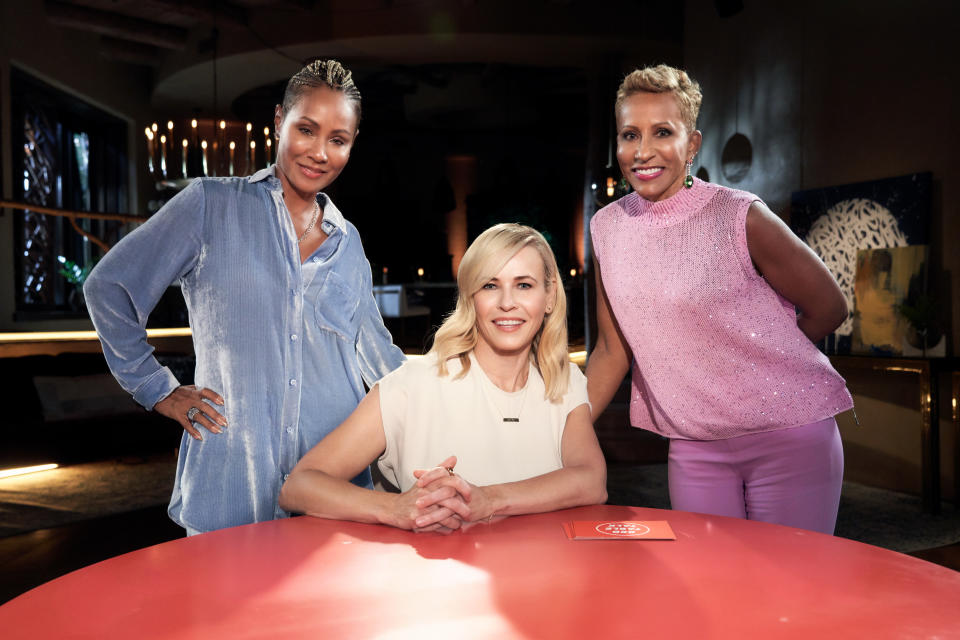Chelsea Handler talks white privilege on 'Red Table Talk': 'It is so up to white people to fix this problem'
Chelsea Handler appeared on Monday’s Red Table Talk to have a frank conversation about white privilege.
The comedian was promoting her new Netflix documentary on the topic (Hello, Privilege. It's Me, Chelsea) and didn’t shy away from what brought her to examine her own behavior. One of the stories she recounted saw Jada Pinkett Smith’s mother, Adrienne Banfield-Jones, declaring herself “shocked and appalled” by Handler’s behavior. However, the takeaway was that having uncomfortable conversations about race just furthers the conversation.

“It is so up to white people to fix this problem,” said Handler, who traveled around grilling people on the topic of white privilege for her doc. She has said — and maintains — that she would not have had her career had she not been white, saying, “A black girl would never have gotten her own show for telling celebrities how stupid they are.”
Handler recalled some less woke times in her life, including one when she slapped a black woman on the butt and was corrected in a way that resonated.
“I know you’re not going to like this,” she prefaced the story, “but I’m going to tell you because it was a learning point. This black woman was standing up singing a song. I went up to her, said, ‘Oh that was beautiful’ and hugged her and slapped her on the butt.”
That led to Banfield-Jones’s “Really? I’m shocked and appalled right now” remark, but Handler said, “So was she,” referring to the woman she slapped. “And she said, 'Black women have been defined by their hair and their asses for ages. You have no right to touch my body.’ And she said, ‘It’s not about the intention, it’s about the reception.’”
Handler said it was a wakeup call for someone who once smacked everyone on their butts.
“I shouldn’t be smacking anybody on their body because it’s disrespectful [and] I’m not taking into account other people’s experiences,” she said. “That was another lightbulb moment.”
She continued, “So when people are like: ‘Well, I didn’t mean anything by it,’” she said, referring to white privilege remarks. “It doesn’t matter if you didn’t mean anything by it. It was received that way. You can’t deny that someone is feeling badly because of your actions.”
Banfield-Jones called Handler’s behavior “classic white privilege right there” and a “total unawareness that for me and my generation we are impatient with now.”
Handler and Banfield-Jones also went back and forth a little when Handler recalled how, in high school, she lived at her African-American’s boyfriend’s home for a while. She recalled how his mother had a drug problem (Handler called her a “crack head”) and, while Handler was just 16, she helped care for her boyfriend’s two younger siblings. (He is featured in the documentary with Handler making the point that when they were teens, they were pulled over by police and he would be arrested, for pot possession, while cops let her go.)
“Did you have that white savior thing happening?” asked Banfield-Jones. “When you moved into his house did you feel like you were the white girl who was going to come in and fix the family?”
Handler said no. “In my family, I was the problem child,” so she appreciated that “in their family, I wasn’t.”
Though as Handler gave more details of the scenario, Banfield-Jones chimed it, “See, that’s a little bit of the white savior there.” However, Handler insisted it wasn’t, saying her problem then was that, “I was up my own ass.”
Handler talked about how “going into the grocery store as a white person is totally different than going into the grocery store as a black person... Nobody’s looking at you to take something. Nobody suspects anything.”
She went on to ask, “Do you know how many times I’ve walked out of grocery stores because the line was too long and I didn’t feel like waiting? I was like: This is annoying. I’m just going to take it. Shoplift it. I mean, talk about entitlement and privilege. I knew I wouldn’t get caught.” Pinkett Smith replied, “Wow.”
As the conversation closed, Handler said, “I think the biggest issue for me as a white person is that everybody is scared to ask questions. They’re so scared to have uncomfortable conversations. It is hard to say to two black women, ‘I want to be respective and I want to be inclusive. Tell me how.’”
She continued, “I want to ask those questions because I want to be educated. I want to ask any sort of marginalized group: What is the most respectful way to refer to you? To include you? You gotta go head first into deep things and get in trouble. [You gotta] say stupid things to learn how to say smarter things.”
Pinkett Smith agreed, “We have to make room for people to say stupid things sometimes. At the end of the day, what we can’t deny as black people is that white privilege has been going on for so long that there is an unconsciousness. Not every slip of the mouth, every action is racist. It’s just not knowing.”
The Red Table Talk show is now streaming on Facebook Watch and Hello, Privilege. It's Me, Chelsea is on Netflix.
Read more from Yahoo Entertainment:
Amy Schumer applauded for ‘relatable’ response to Jessica Simpson’s weight loss post: ‘No rush’
Brooke Shields confirms she lost ‘The View’ co-host job to Jenny McCarthy
Natalie Portman addresses diaper backlash in astronaut movie ‘Lucy in the Sky’
Want daily pop culture news delivered to your inbox? Sign up here for Yahoo Entertainment & Lifestyle’s newsletter.

